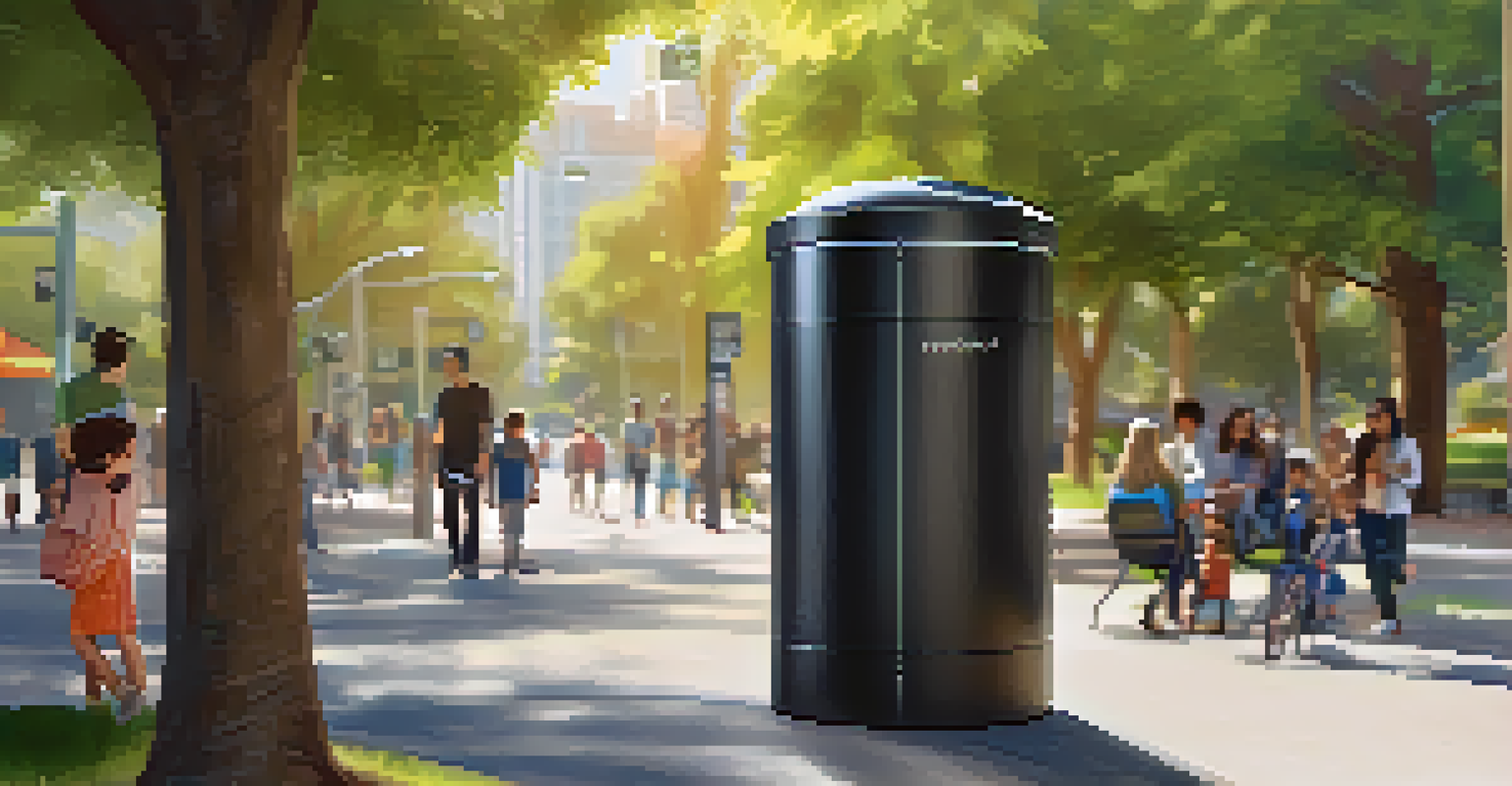Waste Management Challenges in San Francisco's Urban Areas

Understanding San Francisco's Urban Waste Landscape
San Francisco, known for its vibrant culture and progressive policies, faces significant waste management challenges. The dense urban environment, coupled with a growing population, creates unique hurdles in managing waste effectively. With an ambitious goal of zero waste by 2030, the city is navigating complex issues that affect both residents and businesses.
We do not inherit the earth from our ancestors; we borrow it from our children.
Urban areas often generate a higher volume of waste due to the concentration of people and activities. In San Francisco, this includes everything from residential trash to commercial waste from bustling markets and restaurants. The challenge lies not just in collecting this waste, but in ensuring it is processed efficiently and sustainably.
As the city strives to maintain its ecological footprint, understanding the waste landscape is crucial. This means recognizing the types of waste generated and how they can be diverted from landfills through recycling and composting. Education and community involvement play pivotal roles in achieving these goals.
The Impact of Population Growth on Waste Management
San Francisco's population has been steadily increasing, putting additional pressure on its waste management systems. More residents mean more waste, which complicates collection routes and disposal methods. This growth challenges the city to adapt its strategies to keep up with demand while still pursuing sustainability.

With a diverse population, the types of waste generated also vary significantly. The city must cater to different disposal needs and educate its residents on proper waste segregation to minimize contamination. This ongoing effort is vital for ensuring that recyclables and compostables are not mixed with trash.
Population Growth Strains Waste Systems
San Francisco's increasing population complicates waste management by generating more waste and challenging disposal methods.
Moreover, urban growth often leads to increased construction activities, which generate substantial amounts of debris. Managing construction waste effectively requires collaboration with contractors and developers to implement recycling practices, further complicating the waste management landscape.
Challenges in Recycling and Composting Efforts
Despite San Francisco's commitment to recycling and composting, residents often struggle with proper disposal practices. Contamination remains a persistent issue, where non-recyclable items are mistakenly placed in recycling bins. This not only hampers recycling efforts but can also lead to entire batches being sent to landfills.
The greatest threat to our planet is the belief that someone else will save it.
The city has implemented various educational programs to help residents understand what can and cannot be recycled or composted. However, the challenge lies in reaching everyone effectively, especially in diverse neighborhoods where language barriers may exist. Continuous outreach is essential for fostering a culture of responsible waste disposal.
Additionally, the infrastructure for recycling and composting must keep pace with the city's growth. Enhanced facilities and collection services are necessary to handle the increasing volumes of materials, ensuring that recycling and composting can be viable options for all San Francisco residents.
The Role of Technology in Waste Management Solutions
Technology plays a crucial role in modern waste management practices, and San Francisco is no exception. Innovations like smart bins equipped with sensors can help optimize collection routes and reduce operational costs. These technologies not only improve efficiency but also provide valuable data on waste generation patterns.
Moreover, mobile applications can empower residents by offering real-time information on waste collection schedules and proper disposal methods. By making it easier for people to engage with waste management systems, technology fosters a sense of community responsibility towards maintaining a clean city.
Community Engagement is Essential
Effective waste management relies on community involvement and education to promote proper recycling and composting practices.
However, leveraging technology comes with its own set of challenges, such as ensuring equitable access for all residents. The city must ensure that technological advancements are inclusive and cater to the needs of diverse communities, preventing any group from being left behind in the digital divide.
Addressing Homelessness and Waste Management Intersections
San Francisco's homelessness crisis presents unique challenges for waste management efforts. Many individuals experiencing homelessness often lack access to proper waste disposal facilities, leading to increased litter and waste in public spaces. This situation complicates the city's goal of maintaining cleanliness and sustainability.
Collaborative initiatives between the city and local organizations aim to address these challenges by providing resources and support to homeless individuals. Programs that offer waste pickup services and incentivize proper disposal can help mitigate the impact of homelessness on urban waste management.
Furthermore, fostering dialogue between city officials and community advocates is essential for creating comprehensive solutions. By understanding the needs of all residents, including those experiencing homelessness, San Francisco can develop more inclusive waste management strategies that benefit everyone.
Community Engagement and Public Awareness Initiatives
Engaging the community is a fundamental aspect of successful waste management in San Francisco. Public awareness campaigns can educate residents about the importance of recycling and composting, encouraging them to take action in their daily lives. These initiatives can create a sense of ownership and responsibility towards the city's waste management goals.
Events like neighborhood cleanups and workshops on sustainable living not only promote education but also foster community spirit. When residents come together to tackle waste issues, they build connections and share ideas, enhancing their collective impact on the environment.
Technology Enhances Waste Solutions
Innovative technologies like smart bins and mobile apps are crucial for optimizing waste collection and engaging residents.
Moreover, local schools play a vital role in shaping young minds about waste management practices. By incorporating sustainability education into school curriculums, San Francisco can empower the next generation to become environmentally conscious citizens, ensuring that efforts to combat waste continue for years to come.
Collaborative Approaches to Waste Management Solutions
Addressing waste management challenges requires collaboration among various stakeholders, including governmental agencies, businesses, and community organizations. San Francisco has taken significant steps to create partnerships that share resources and expertise, enhancing the city's overall waste management strategy. This collaborative approach helps streamline processes and fosters innovation.
For instance, local businesses can play a pivotal role in adopting sustainable practices and reducing waste generation. By working together, the city and its business community can develop programs that incentivize waste reduction, such as composting initiatives or responsible packaging solutions. These efforts not only benefit the environment but also enhance the reputation of businesses as eco-friendly entities.

Additionally, partnerships with non-profit organizations can provide valuable insights and support in reaching underserved communities. By combining forces, San Francisco can create a more comprehensive waste management system that addresses the unique challenges faced by different neighborhoods, ultimately leading to a cleaner, greener city.